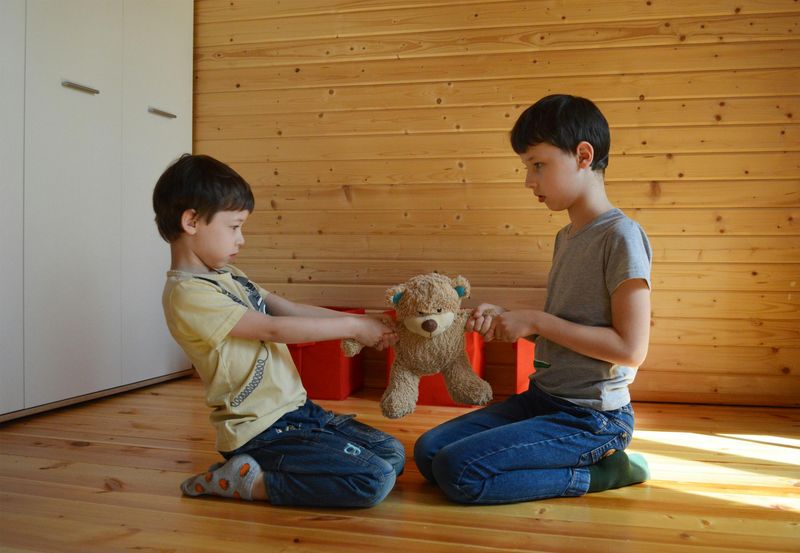12 Things Only People from Large Families Truly Understand

Growing up in a large family is like living in your own small community. The constant chaos, the never-ending noise, and the perpetual search for privacy shape your childhood in unique ways. If you come from a household with many siblings, you’ll instantly recognize these everyday realities that those from smaller families might find hard to believe.
1. Privacy Is Just a Myth

Bathroom doors in large families might as well be revolving. Just when you think you’ve found a moment of peace, someone’s knocking urgently or simply barging in without warning. Personal space becomes a luxury you can only dream about.
Bedrooms are rarely yours alone – they’re shared territories where negotiations over shelf space and decorations become diplomatic missions. Many large-family kids perfect the art of creating invisible boundaries using pillows, tape on floors, or elaborate warning systems.
Even diaries need creative hiding spots, as curious siblings consider snooping a legitimate pastime. The concept of alone time becomes so foreign that many adults from large families actually struggle with too much quiet later in life!
2. Clothing Ownership Is Flexible

Your wardrobe isn’t really yours in a house full of siblings. That favorite sweater you bought last week? It’s already being worn by your sister without permission. Shoes, socks, and accessories circulate through the household like community property despite your name tags and desperate pleas.
Hand-me-downs aren’t just occasional – they’re a way of life. You recognize clothes by their history: “the shirt that was Mom’s, then Sarah’s, then mine” becomes its official name. Shopping trips are rare treasures because new, untouched items feel like precious gold.
The most prized possessions get hidden in secret spots or worn repeatedly before washing to prevent their disappearance. Meanwhile, the laundry pile resembles Mount Everest, with mysterious single socks that never find their matches again!
3. Food Disappears at Warp Speed

Grocery shopping isn’t an errand – it’s an expedition requiring military-grade planning. The cart overflows with family-sized everything, and the checkout total makes single-child families gasp in horror. Yet somehow, those supplies vanish within days.
That delicious leftover pizza you were saving for lunch? Gone by morning. The cookies that were supposed to last all week? Decimated within hours. Large-family kids develop lightning-fast reflexes at the dinner table because hesitation means empty plates.
Secret food stashes become necessary survival tactics. Everyone has hidden granola bars or chips somewhere only they know about. And woe to anyone who takes the last of anything without replacing it – such crimes against humanity are never forgotten in family lore!
4. Noise Is Your Natural Habitat

Silence feels wrong when you’re from a big family. The constant background symphony of voices, footsteps, doors slamming, and multiple electronic devices playing different things simultaneously becomes your normal.
Visitors often look shellshocked by the volume level that you don’t even notice anymore. Conversations happen in layers, with multiple discussions occurring simultaneously in the same room. You’ve mastered the art of following three different conversations while watching TV.
As adults, many large-family kids find they can’t concentrate in complete quiet. They’ll turn on background noise just to focus because silence feels eerie and unnatural. The ability to tune out chaos becomes a superpower that serves well in crowded offices, busy restaurants, or any high-stimulus environment!
5. Car Trips Require Strategic Planning

Family vacations start with the complex puzzle of fitting everyone into the vehicle. The dreaded middle seat becomes a battleground, with elaborate systems of rotation to ensure fairness. “Shotgun” calls begin hours before departure.
Bathroom breaks multiply exponentially with each additional family member. What should be a three-hour trip stretches to five as the caravan stops for the sixth time because someone didn’t go “when they had the chance.” Packing resembles preparing for a military campaign rather than a weekend getaway.
Road trip games evolve from simple I-Spy to complex competitions designed specifically to minimize fighting. Parents perfect the art of threatening to “turn this car around right now” while never actually doing it. Meanwhile, the family vehicle bears permanent evidence of these journeys in the form of mysterious stains and long-lost toys wedged between seats!
6. Holidays Are Magnificent Chaos

Christmas morning in a large family isn’t just gift opening – it’s a three-hour marathon event. Present distribution requires spreadsheets to ensure equal numbers and spending. The wrapping paper aftermath resembles a festive blizzard.
Thanksgiving tables extend through multiple rooms with mismatched chairs borrowed from neighbors. Family recipes multiply to industrial quantities – measuring ingredients by pounds rather than cups. Special occasions mean strategic kitchen scheduling, with dishes prepared in carefully orchestrated shifts.
Birthday celebrations happen in clusters by season rather than on actual birth dates. The birthday song sounds like a boisterous choir rather than a modest tune. While the chaos might overwhelm outsiders, large-family kids wouldn’t trade these rowdy celebrations for anything – they’re where the most cherished memories form amid the beautiful disorder!
7. Built-In Entertainment System

Boredom is a foreign concept when surrounded by siblings. There’s always someone to play with, argue with, or blame things on. Backyard games naturally have enough participants for teams without recruiting neighborhood kids.
Rainy days transform into elaborate productions of homemade plays, talent shows, or Olympic-style competitions using household items. Board games become intense tournaments lasting days, complete with alliances, betrayals, and dramatic comebacks.
The imagination multiplies with each sibling adding their creative twist to activities. While electronic entertainment exists, the most memorable fun comes from invented games with ridiculous rules that evolve over years. These homegrown entertainment skills often translate to adult life as an ability to make fun out of ordinary situations and never needing external sources for amusement!
8. Bathroom Scheduling Requires NASA-Level Coordination

Morning routines in large families operate like precision clockwork. Bathroom time becomes a limited resource more valuable than gold, with strict time limits enforced under threat of door-pounding and urgent pleas.
Shower schedules get posted like official documents. The hot water supply becomes a finite resource that early risers monopolize, leaving later showerers to brave the cold. Everyone knows exactly how many minutes they have before the next person’s turn.
The counter space battle rages constantly, with personal items mysteriously migrating or disappearing altogether. Toothbrushes require color-coding or marking systems to prevent mix-ups. The phrase “hurry up in there!” becomes so common it might as well be the family motto, permanently echoing through hallways at peak bathroom hours!
9. Volume Control Is Optional

Normal conversation volume starts at what others would consider shouting. Being heard above the family din requires vocal projection that would impress theater directors. Dinner discussions resemble friendly debates where the loudest voice wins temporary attention.
Parents develop selective hearing, miraculously tuning out the constant background noise while somehow detecting a whispered scheme from three rooms away. The concept of “inside voices” seems theoretical rather than practical in daily life.
Phone conversations require finding closets or unusual corners for any hope of hearing the other person. Friends visiting for the first time often look startled by the volume, while family members don’t even notice. Later in life, large-family kids get feedback about “projecting too much” in quiet settings, having never learned proper volume calibration!
10. Conflict Resolution Skills Come Naturally

Diplomacy isn’t just a career choice – it’s a daily survival skill when navigating multiple sibling relationships. You learn early how to negotiate everything from TV privileges to the last cookie, developing persuasion tactics that would impress professional mediators.
Alliances form and dissolve based on common interests and current grievances. Today’s enemy might be tomorrow’s confidant depending on what’s at stake. Parents serve as the supreme court for major disputes, but most conflicts get resolved through elaborate systems of trades, favors, and compromises.
These childhood negotiations build remarkable conflict resolution skills that transfer to adult relationships and workplaces. Many large-family kids grow up to excel in fields requiring diplomacy, management, or team coordination – they’ve been training for these roles their entire lives!
11. Privacy Becomes a Treasure Hunt

Finding solitude requires creativity and determination in a house bursting with family members. Unusual spots become sacred retreats – the space behind the couch, a specific tree in the backyard, or even the laundry room during off-hours.
Reading a book undisturbed means developing ninja-like stealth to slip away unnoticed. Phone calls with friends or significant others often happen in closets, bathrooms, or while walking around the block just to have a private conversation.
Large-family kids perfect the art of creating mental privacy even in crowded rooms, building invisible bubbles through headphones, books, or simple determined focus. These hard-earned skills translate to adult life as an unusual ability to concentrate amid distractions, finding personal space in crowded environments, and appreciating solitude when it finally becomes available!
12. Teamwork Becomes Second Nature

Household chores in large families operate like well-oiled machines. Everyone has assigned responsibilities that rotate regularly – today’s dishwasher becomes tomorrow’s floor sweeper. These systems teach cooperation long before any workplace team-building exercise.
Major cleaning days transform into all-hands-on-deck operations with specific zones assigned to each person. The family can deep-clean the entire house in hours through coordinated effort, complete with music blasting and good-natured complaints.
This natural teamwork extends beyond chores to supporting each other through challenges. Older siblings help younger ones with homework, while younger ones might cover for their elders’ missed chores. These experiences build lifelong collaborative skills that make large-family kids exceptional team players in professional settings – they understand instinctively how individual contributions create collective success!

Comments
Loading…